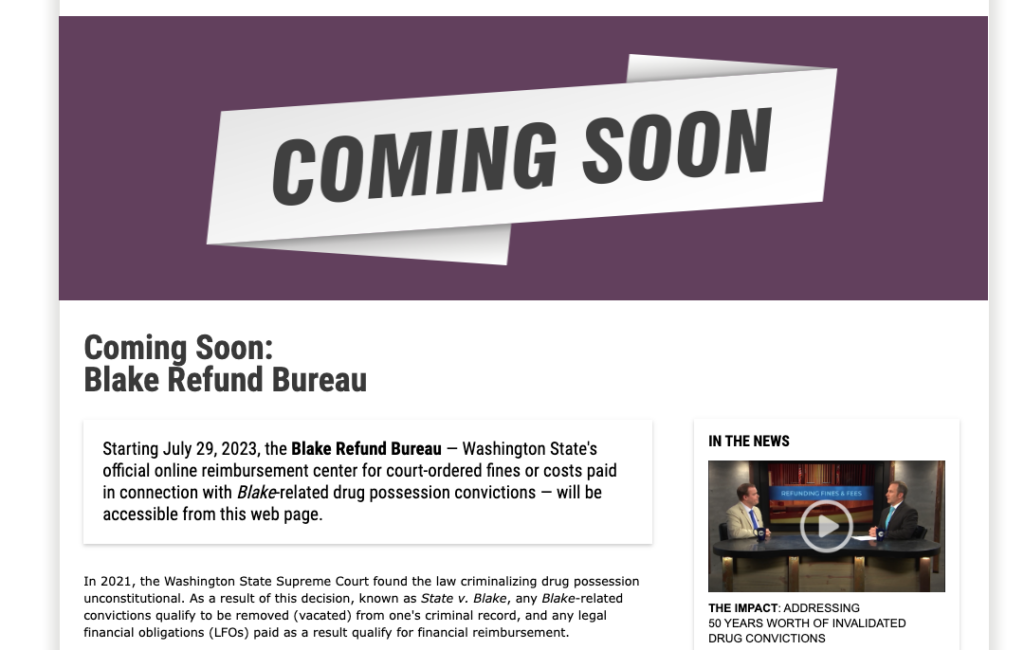OLYMPIA — Between 1971, the year President Richard Nixon announced the war on drugs, and 2021, when a court decision upended the state’s long-standing drug possession law, Washington courts handed down hundreds of thousands of convictions for drug possession.
Starting this weekend, people convicted of drug possession during those 50 years could get the money they paid in fines, fees and other costs on those cases back. The state Saturday is launching a website where you can request a refund.
The state Supreme Court decision in 2021 found Washington’s drug possession law was unconstitutional because a person could face prosecution even if they didn’t know they possessed drugs.
The court said in State v. Blake that the statute violated the due process clause of the state and federal constitutions, and that it was void. The majority opinion noted that felony drug possession, at the time, could be punished by a maximum of five years in prison and a $10,000 fine.
Since then, state lawmakers have rewritten the law to state that “knowing” drug possession is a crime. And they have also approved roughly $100 million to help courts vacate old cases, and to pay people back the fines and fees, which could add up to hundreds or thousands of dollars per case.
Who is eligible
People convicted of simple drug possession, cannabis possession, and some paraphernalia convictions between 1971 and 2021 could be eligible for a refund.
Only people who were convicted or pled guilty to a Blake-related charge and paid what are referred to as “legal financial obligations” — fines, fees and other costs associated with the case — are eligible, said Robin Zimmermann, spokesperson for Washington’s Administrative Office of the Courts, in an email.
A person who was acquitted, had their case dismissed or went through a diversion program would not qualify to get their case vacated or for reimbursement.
Reimbursement might also apply in circumstances where a person has died or is incapacitated and has a guardian. If a personal representative of an estate or a guardian can show documentation that they represent the person who had the drug conviction, they can apply for the refund.
Before you can apply for a refund, you must have your conviction vacated by a judge.
You can call the Blake hotline at 360-586-3164, and dial extension 218, for help getting your conviction vacated. You can also go to www.washingtonlawhelp.org/resource/blake to get help vacating your conviction.
How to apply
Once a court has vacated your conviction or convictions, you can get started on the refund, which can be done at www.courts.wa.gov/blakerefund, or through the mail.
If you’re applying online, you’ll need an email address. If you’re applying by mail, you don’t need an email address, but you do need to be able to download, print and fill out the form.
Court clerks will have access to PDF downloads of the refund application, so you can get a printed copy at your local courthouse, but the Blake Refund Bureau, the division within the Administrative Office of the Courts administering the refunds, encourages applying online instead because the process could be slower by mail.
In applying for a refund, you will need to provide your full name, case number and proof of identification with a picture — like a driver’s license.
You’ll also need proof that you’ve changed your name, or a divorce decree, if your name has changed since you were convicted or pled guilty.
If you have multiple convictions, you’ll need to apply separately for a refund for each case.
You also might be able to get reimbursed for expenses paid to a third party — such as a lawyer — if you get approval from a judge. You’ll have to provide documentation of those third-party payments to get reimbursed, said Sharon Swanson, Blake implementation manager at the Administrative Office of the Courts.
New system
As the system gets up and running, officials estimate it could take 90 days for the first payments to be issued.
“We have a buffer of 90 days,” Swanson said in a media briefing last week. “We do anticipate there will be a delay when we initially start up the process on July 29, simply because we can’t anticipate how many cases are going to come in.”
The bureau estimates about 260,000 felony convictions could be eligible for reimbursement and an additional 126,000 convictions for marijuana and some paraphernalia offenses could be eligible, too.
It’s possible that you could look up your case on the Blake Refund Bureau’s website and not see any results, even though you know you have a conviction, said Jamie Kambich, manager for the court business office at the Administrative Office of the Courts.
Your information might not be in the system yet. If that happens, you should contact the court where you were convicted or pleaded guilty.
In some cases, the state might know right away what your refund amount should be, but in others, the state might not know how much the refund should be and will need to contact a local court to figure out how much is owed.
The payments will not be adjusted for inflation — so if you paid $100 in, say, 1996, you would get $100 back if you’re eligible for a refund.
The Administrative Office of the Courts could not provide an average figure per conviction. Fines and fees have changed over time, Zimmermann said. Some areas have started waiving fines and fees for indigent defendants.
Washington courts must consider a defendant’s ability to pay when imposing costs and fees, and that has been in state law for a while, according to the ACLU of Washington. In 2015, the Washington Supreme Court specified that courts must evaluate a defendant’s ability to pay.
In recent years, policymakers have been rethinking the role of fines and fees in the criminal legal system, and Washington legislators have passed several bills to limit fees and costs on defendants who can’t afford it.



